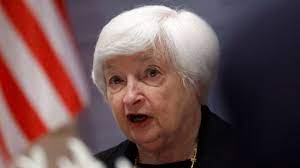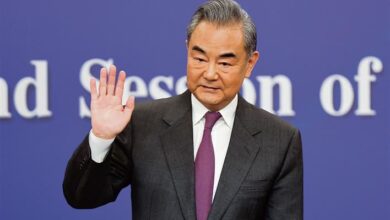US Treasury Chief Yellen Requests China’s Assistance With Climate Change And Other International Issues
On Saturday, Treasury Secretary Janet Yellen urged China to cooperate in addressing climate change and other global issues rather than allowing conflicts over trade and other irritants to sour ties.
Vice Premier He Lifeng, her Chinese counterpart, and Yellen met and Yellen defended US export curbs on technology that are unpopular in Beijing. She said that such conflicts shouldn’t cause the two countries’ growing commercial and financial links to suffer.

In addition, there are significant global issues, such as climate change and the debt crisis in developing and emerging economies. We owe it to our economy and to other nations to work together.
A number of American officials, including Yellen, are scheduled to visit Beijing as part of attempts to improve ties, which are at their worst point in decades as a result of disagreements over Taiwan, technology, security, and other concerns.
Premier Li Qiang, the second-ranking member of the Chinese Communist Party, was among the officials who greeted Yellen warmly, but they made no indication that they would adjust their policy toward Washington and other nations.
According to Treasury officials, the trip’s objective was to promote dialogue and no settlements on significant disagreements were anticipated. They said that Yellen wasn’t expected to meet Xi Jinping, the president of China.
In retribution for Speaker Nancy Pelosi of the House of Representatives’ travel to Taiwan, the self-governing island democracy that China claims as part of its territory, Beijing ended climate talks with Washington in August.
The next top American official to visit China is John Kerry, the climate envoy for President Joe Biden.
The two countries that produce the most carbon emissions globally are China and the United States.
He is Xi’s top economic advisor and China’s senior trade and finance ambassador to the United States. He said the two governments should adhere to the agreement Biden and Xi made last November to enhance ties.
The vice premier stated, “The two countries should act with a sense of responsibility for history, for the people, and for the world.”
He continued by saying that the US should “adopt a rational and pragmatic attitude and work with China to stay committed to the common understandings” made between Xi and Biden.
China reached an agreement last month to lower the debts owed by Zambia in southern Africa. China has financed governments in Asia and Africa billions of dollars to develop ports and other infrastructure as part of Xi’s Belt and Road Initiative. Treasury officials had before mentioned it as an instance of when collaboration had paid off.
Also on Saturday, Yellen met with Pan Gongsheng, the next governor of China’s central bank, and representatives of the country’s climate financing sector.
During her meeting with He, Yellen reiterated her call for “healthy economic cooperation,” in response to criticisms that Beijing breaches its free-trade agreements by subsidizing and protecting its industries from rivalry.
Yellen supported American export restrictions on technology, reinforcing a point she made at a meeting with Li, the premier, on Friday.
The Chinese government’s ambitions to advance telecom, artificial intelligence, and other industries might be hindered or derailed by U.S. restrictions on their access to processor chips and other technologies. In March, Xi said that Washington was attempting to obstruct China’s progress.
Beijing has been reluctant to respond in like, perhaps to prevent upsetting its own sectors. But last week, the government unveiled vague export restrictions on the metals gallium and germanium, which are needed to create solar panels and semiconductors.
According to Yellen, “The United States will take specific actions to protect our national security.” “While we may disagree on these courses of action, we should not allow that disagreement to result in misunderstandings, especially those brought on by a lack of communication, which could unnecessarily worsen our bilateral economic and financial relationship.”







